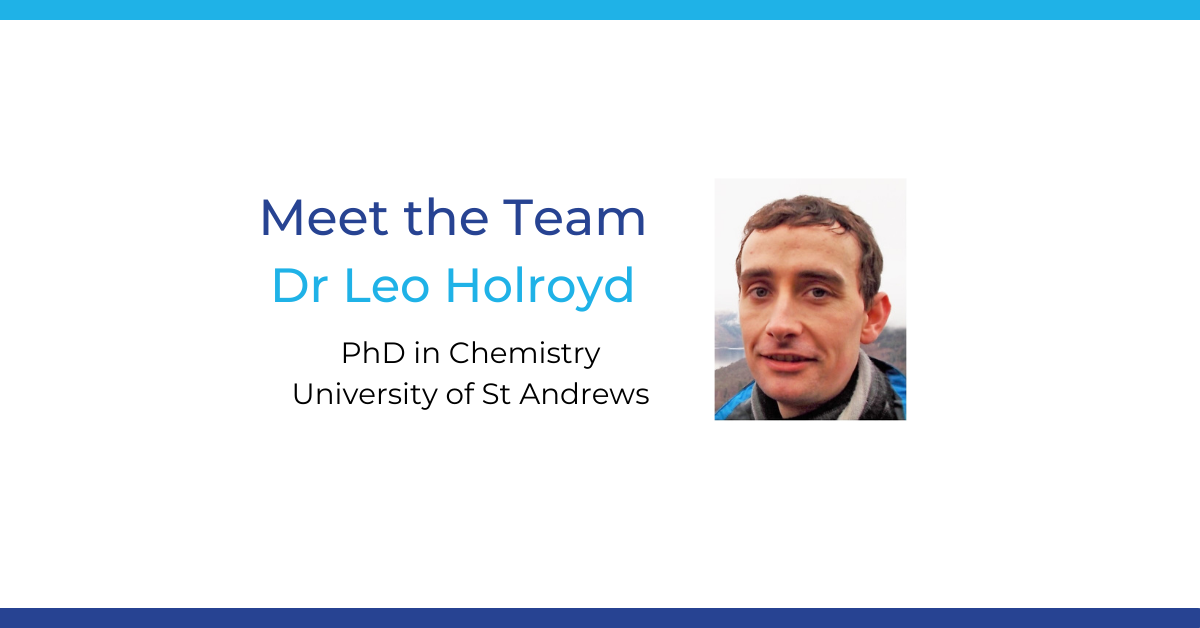
The life of an academic editor is often a thankless task, working in the background with little acknowledgement of the hours spent at the keyboard. With that in mind, and to give you insight into who is behind the scenes actually editing your papers, we’re pleased to launch “Meet the Team”, where our hard-working, gifted editing team share more about their backgrounds as well as thoughts on editing and academic writing. In this interview our Managing Editor, Physical Sciences, Dr Leo Holroyd, tells us about his experience, views and suggestions for authors.
Could you tell us a little more about your educational background?
Sure. For university, I went to UCL in London – not far from my hometown in the UK – to study Chemistry (MSci). Why straight to an MSci without a Bachelor’s degree? Well, many British universities now combine the traditional BSc and MSc into a single four-year course! After graduating, I spent several years in a range of occupations, but was drawn back to academia and took a PhD at beautiful St. Andrews in Scotland. My computational research was on small molecules that play a role in the body, like DNA bases and amino acids, and I published five papers. I also had a great time into the bargain! Just a year after graduating, I started out as a freelance academic editor.
How long have you worked in the academic editing industry? Why are you interested in this line of work?
I’ve been in this industry a little over five years. My interests aren’t only in physical science – ever since childhood I’ve been a keen reader of practically anything. The more you read, the better you learn to write. If you have specific knowledge of a subject as well, you can make a real difference by helping researchers to communicate their work.
Which fields of study do you edit the most?
According to my records, the field in which I edit most is engineering! This is mostly chemical, mechanical and transportation engineering. To me, the popularity of these subjects in China reflects the country’s dynamic growth and modernisation, as well as the high levels of innovation taking place to meet the needs of future societies. These papers touch on important concerns like building safety, climate remediation and low-carbon transport.
Do you have any suggestions for non-native English authors to enhance their chances of successful publication?
In terms of language, I would advise authors to read papers authored by native English speakers in the most prestigious journals in their field. The best writing is distinguished by simple, direct language, but such an approach takes a leap of confidence from the writer. Therefore, read highly cited research by native (or near-native) English-speaking academics and see what needs to be included and what doesn’t. In terms of content and presentation, international relevance is the key. Science is universal, and the technical challenges facing Asian societies are just as pressing in the rest of the world. So mention some examples of how your research could be applied in another context.
Are there any common grammatical errors that you regularly spot when editing journal papers?
I have one tip, which ties in with the concept of writing simply and directly. When presenting various items of information in a group of sentences, it’s not always necessary to begin each sentence with a linking phrase such as “In addition” or “Besides”. For example, if you’re describing several methods that were used in your study, it’s perfectly acceptable for each sentence to be a standalone phrase, such as “We used method x to study y…”, without any linking phrase at the start. This is simpler and more logical.
You must have to do a lot of reading and editing every day. What are your tips for staying concentrated?
For me, the single most important thing is to slow down when you reach a difficult part – and take a break if you need to. When you edit a paper, the author has entrusted you with their intellectual property. To help convey the research as clearly as possible, you can’t only edit sentence-by-sentence but need to consider the overall meaning of the work. Sometimes it all becomes clear if you show some patience.
We will be speaking with another member of our editing team in the next issue. Do keep an eye out for it!
Meanwhile if you are looking for a professional editing service to improve your chances of publication success, check out our academic editing service which is trusted by many leading academics!
Check out AsiaEdit’s professional research grant proposal editing service.
Read more about our training services covering all aspects of academic writing tailored for local institutions.
More resources on research grant proposal writing: On-demand Webinars
Preparing an effective research proposal – Your guide to successful funding application
Preparing an effective research proposal – Your guide to successful funding application (Part 2)
您的日程安排,我們最關切 AsiaEdit 採用個性化的編修方法。
亞洲專業語言有限公司台灣分公司
110 台北市信義區基隆路二段15號10樓
9:00am – 6:00pm
+886 2 7705 3216
